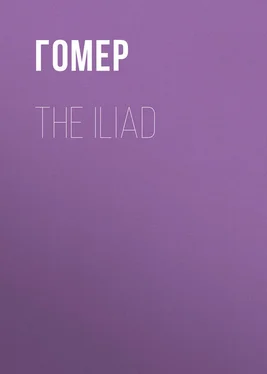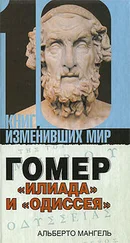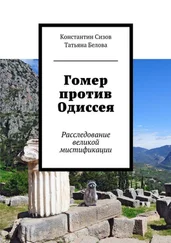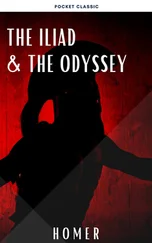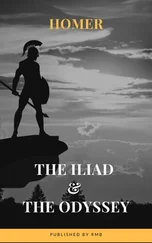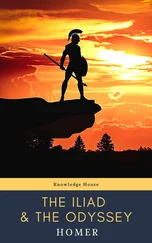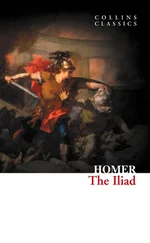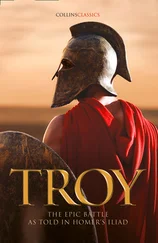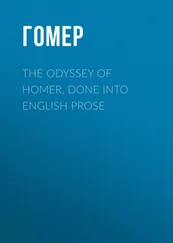Гомер - The Iliad
Здесь есть возможность читать онлайн «Гомер - The Iliad» — ознакомительный отрывок электронной книги совершенно бесплатно, а после прочтения отрывка купить полную версию. В некоторых случаях можно слушать аудио, скачать через торрент в формате fb2 и присутствует краткое содержание. Жанр: foreign_antique, foreign_prose, на английском языке. Описание произведения, (предисловие) а так же отзывы посетителей доступны на портале библиотеки ЛибКат.
- Название:The Iliad
- Автор:
- Жанр:
- Год:неизвестен
- ISBN:нет данных
- Рейтинг книги:4 / 5. Голосов: 1
-
Избранное:Добавить в избранное
- Отзывы:
-
Ваша оценка:
- 80
- 1
- 2
- 3
- 4
- 5
The Iliad: краткое содержание, описание и аннотация
Предлагаем к чтению аннотацию, описание, краткое содержание или предисловие (зависит от того, что написал сам автор книги «The Iliad»). Если вы не нашли необходимую информацию о книге — напишите в комментариях, мы постараемся отыскать её.
The Iliad — читать онлайн ознакомительный отрывок
Ниже представлен текст книги, разбитый по страницам. Система сохранения места последней прочитанной страницы, позволяет с удобством читать онлайн бесплатно книгу «The Iliad», без необходимости каждый раз заново искать на чём Вы остановились. Поставьте закладку, и сможете в любой момент перейти на страницу, на которой закончили чтение.
Интервал:
Закладка:
And of them that dwelt in Methone and Thaumakie, and possessed Meliboia and rugged Olizon, of these, even seven ships, was Philoktetes leader, the cunning archer; and in each ship sailed fifty oarsmen skilled to fight amain with the bow. But their captain lay enduring sore pain in the isle of goodly Lemnos, where the sons of the Achaians left him sick of a grievous wound from a deadly water-snake. There lay he pining; yet were the Argives soon to bethink them beside their ships of king Philoktetes. Yet neither were his men leaderless, only they sorrowed for their leader; but Medon marshalled them, Oileus' bastard son, whom Rhene bare to Oileus waster of cities.
And of them that possessed Trikke and terraced ithome and that possessed Oichalia city of Eurytos the Oichalian, of these again Asklepios' two sons were leaders, the cunning leeches Podaleirios and Machaon. And with them were arrayed thirty hollow ships.
And of them that possessed Ormenios and the fountain of Hypereia, and possessed Asterion and the white crests of Titanos, of these was Eurypylos leader, Euaimon's glorious son; and with him, forty black ships followed.
And of them that possessed Argissa and dwelt in Gyrtona, Orthe and Elone and the white city of Olooson, of these was captain unflinching Polypoites, son of Peirithoos that immortal Zeus begat: and Polypoites did famed Hippodameia conceive of Peirithoos on that day when he took vengeance of the shaggy wild folk, and thrust them forth from Pelion and drave them to the Aithikes. And Polypoites ruled not alone, but with him was Leonteus of the stock of Ares, son of high-hearted Koronos Kaineus' son. And with them forty black ships followed.
And Gouneus from Kyphos led two-and-twenty ships, and with him followed the Enienes and unflinching Peraibians that had pitched their homes about wintry Dodona, and dwelt on the tilth about lovely Titaresios that poureth his fair-flowing stream into Peneios. Yet doth he not mingle with the silver eddies of Peneios, but floweth on over him like unto oil, seeing that he is an offspring from the water of Styx, the dread river of the oath.
And the Magnetes were led of Prothoos son of Tenthredon, even they that dwelt about Peneios and Pelion with trembling leafage. These did fleet Prothoos lead, and with him forty black ships followed.
So these were the leaders of the Danaans and their captains. Now tell me, O Muse, who among them was first and foremost, of warriors alike and horses that followed the sons of Atreus. Of horses they of Pheres' son were far goodliest, those that Eumelos drave, swift as birds, like of coat, like of age, matched to the measure of a levelling line across their backs. These were reared in Peraia by Apollo of the silver bow, two mares carrying onward the terror of battle. But of warriors far best was the Telamonian Aias, while the wrath of Achilles yet endured; for he was greatest of all, he and his horses that bore him, even Peleus' noble son. But he lay idle among his seafaring ships, in sore wrath against Agamemnon Atreus' son, shepherd of the host; and his folk along the sea-shore sported with quoits and with casting of javelins and archery; and the horses each beside his own chariot stood idle, champing clover and parsley of the marsh, and their lords' chariots lay well covered up within the huts, while the men yearned for their warrior chief, and wandered hither and thither through the camp and fought not.
So marched they then as though all the land were consuming with fire; and the earth groaned beneath them as at the wrath of Zeus whose joy is in the thunder, when he lasheth the earth about Typhoeus in the country of the Arimoi, where men say is Typhoeus' couch. Even so groaned the earth aloud at their tread as they went: and with speed advanced they across the plain.
Now fleet Iris the wind-footed went to the Trojans, a messenger from aegis-bearing Zeus, with a grievous message. These were holding assembly at Priam's gate, being gathered all together both young men and old. And fleet-footed Iris stood hard by and spake to them; and she made her voice like to the voice of Polites son of Priam, who was the sentinel of the Trojans and was wont to sit trusting in his fleetness upon the barrow of Aisyetes of old, and on the top thereof wait the sallying of the Achaians forth from their ships. Even in his likeness did fleet-footed Iris speak to Priam: "Old man, words beyond number are still pleasant to thee as erst in the days of peace; but war without respite is upon us. Of a truth have I very oft ere now entered into battles of the warriors, yet have I never seen so goodly a host and so great; for in the very likeness of the leaves of the forest or the sands of the sea are they marching along the plain to fight against the city. But Hector, thee do I charge beyond all to do even as I shall say. Seeing that the allies are very many throughout Priam's great city, and diverse men, being scattered abroad, have diverse tongues; therefore let each one give the word to those whose chieftain he is, and them let him lead forth and have the ordering of his countrymen."
So spake she, and Hector failed not to know the voice of the goddess, and straightway dismissed the assembly, and they rushed to arms. And the gates were thrown open wide, and the host issued forth, footmen and horsemen, and mighty din arose.
Now there is before the city a certain steep mound apart in the plain, with a clear way about it on this side and on that; and men indeed call this "Batieia," but the immortals call it "The tomb of lithe Myrine." There did the Trojans and their allies divide their companies.
Amid the Trojans great Hector of the glancing helm was leader, the son of Priam; with him the greatest hosts by far and the goodliest were arrayed, eager warriors of the spear.
But the Dardanians were led of the princely son of Anchises, Aineias, whom bright Aphrodite conceived to Anchises amids the spurs of Ida, a goddess wedded to a mortal. Neither was he alone; with him were Antenor's two sons, Archelochos and Akamas, well skilled in all the ways of war.
And of them that dwelt in Zeleia beneath the nethermost foot of Ida, the men of substance that drink the dark waters of Aisepos, even the Troes; of these Lykaon's glorious son was leader, Pandaros, to whom Apollo himself gave the bow.
And of them that possessed Adresteia and the land of Apaisos and possessed Pityeia and the steep hill of Tereia, of these Adrestos was captain, and Amphios of the linen corslet, the two sons of Merops of Perkote, that beyond all men knew soothsaying, and would have hindered his children marching to murderous war. But they gave him no heed, for the fates of black death led them on.
And they that dwelt about Perkote and Praktios and possessed Sestos and Abydos and bright Arisbe, these were led of Hyrtakos' son Asios, a prince of men, Asios son of Hyrtakos, whom his tall sorrel steeds brought from Arisbe, from the river Selleeis.
And Hippothoos led the tribes of the Pelasgians that fight with spears, them that inhabited deep-soiled Larisa. These were led of Hippothoos and Pylaios of the stock of Ares, twain sons of Pelasgian Lethos son of Teutamos.
And the Thracians were led of Akamas and hero Peiroos, even all they that the strong stream of Hellespont shutteth in. And Euphemos was captain of the Kikonian spearmen, the son of Troizenos Keos' son, fosterling of Zeus.
But Pyraichmes led the Paionians with curving bows, from far away in Amydon, from the broad stream of Axios, Axios whose water is the fairest that floweth over the face of the earth.
And Pylaimenes of rugged heart led the Paphlagonians from the land of the Eneti, whence is the breed of wild mules. This folk were they that possessed Kytoros and dwelt about Sesamon, and inhabited their famed dwellings round the river Parthenios and Kromna and Aigialos and lofty Erythini.
Читать дальшеИнтервал:
Закладка:
Похожие книги на «The Iliad»
Представляем Вашему вниманию похожие книги на «The Iliad» списком для выбора. Мы отобрали схожую по названию и смыслу литературу в надежде предоставить читателям больше вариантов отыскать новые, интересные, ещё непрочитанные произведения.
Обсуждение, отзывы о книге «The Iliad» и просто собственные мнения читателей. Оставьте ваши комментарии, напишите, что Вы думаете о произведении, его смысле или главных героях. Укажите что конкретно понравилось, а что нет, и почему Вы так считаете.
